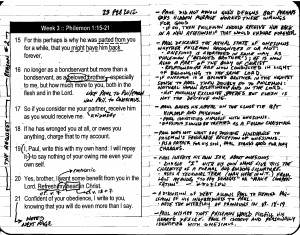NOW THE IDENTITY OF THE perfect Servant comes into sharp focus. Isaiah 53, or better, Isaiah 52:13–53:12, is the fourth of five Servant songs that describe him. “See, my servant” (Isa. 52:13), God says, echoing the introduction to this Servant in Isaiah 42:1. The “arm of the LORD,” God’s saving power, has been promised in Isaiah 51:9 and 52:10. Now the question becomes, “[T]o whom has the arm of the LORD been revealed?” (Isa. 53:1). The implicit answer in this high point of Isaiah’s prophecy is that God’s saving power is nowhere more clearly seen than in the work of the Servant. In the previous chapters God has repeatedly promised forgiveness to his people, but its basis has not been established. Here all becomes clear: “my righteous servant will justify many … he will bear their iniquities” (Isa. 53:11). He is a priest, sprinkling the unclean (Isa. 52:15); he is a guilt offering, removing their iniquities (Isa. 53:10).
The first of five sections (Isa. 52:13–15) anticipates the whole: “My servant will act wisely,” God says, anticipating the conclusion. Beginning with the Servant’s exaltation (Isa. 52:13), this stanza descends to his appalling suffering (Isa. 52:14) and ends with the “sprinkling” of many nations and the stunned reaction to it. “Sprinkling” with blood, oil, or water is in the Old Testament bound up with cleansing, i.e., with making a person or thing fit to come before God. Normally this has reference to Israel or its institutions, but not here: this is for “many nations” (Isa. 52:15). The stunned reaction testifies that God’s wisdom overthrows and confounds all human wisdom (cf. 1 Cor. 1:18–2:5).
In the second and third stanzas (Isa. 53:1–3, 4–6) the speakers are witnesses. God has repeatedly called on his people to bear witness to him (Isa. 43:10, 12; 44:8), but they have been blind and deaf. Now, not only do they attest that the Lord alone is God (Isa. 43:12), but they bear witness to what God has done through his suffering, vindicated, exalted Servant. At first, reactions to him are cautious, and then negative (Isa. 53:1–3). He grew to be despised and rejected by men: “we esteemed him not,” the witnesses say. Indeed, when he was barbarically killed, many thought it God’s providential judgment (Isa. 53:4)—and they spoke better than they knew. But the witnesses come to grasp that “he was pierced for our transgressions, he was crushed for our iniquities”—a substitutionary lamb (Isa. 53:5–7). In the fourth stanza (Isa. 53:7–9) Isaiah reflects on the Servant’s silent suffering and ambivalent death and burial (Had God accepted his work?), to end in the fifth (Isa. 53:10–12) with resounding affirmation of the purposes of God. God’s Servant will act wisely (Isa. 52:13); “by his knowledge” he will (literally) cause many to become righteous, “and he will bear their iniquities” (Isa. 53:11). Reflect on Matthew 1:21. Hallelujah! What a Savior!
via Deuteronomy 26; Psalms 117–118; Isaiah 53; Matthew 1 – For the Love of God.
